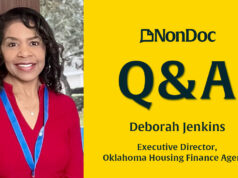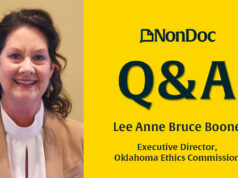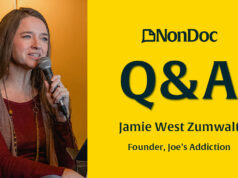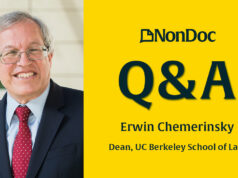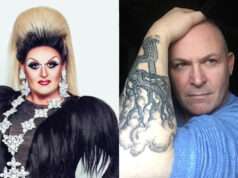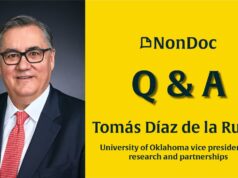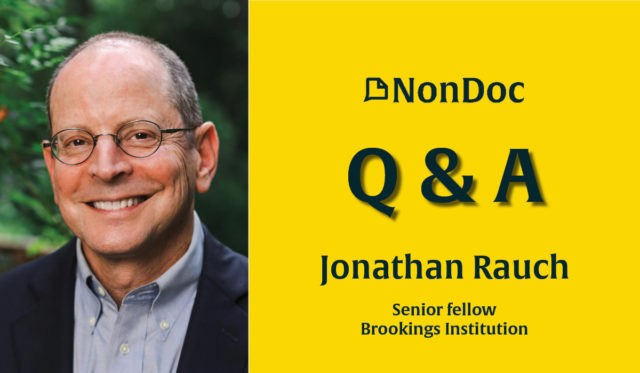

Now and in the coming years, the world — and American democracy in particular — faces a “truth crisis,” according to Jonathan Rauch, a senior fellow of government studies at the Brookings Institution.
Rauch published a book on the topic last year, and at 2 p.m. Monday, Sept. 19, he will be on the campus of Rose State College to talk about what he calls the “Constitution of Knowledge.” More details about Rauch’s speech at Rose State can be found on Facebook, and tickets can be purchased here.
Ahead of his visit to Oklahoma, Rauch answered questions from NonDoc about his work and his perspective on modern civic society. In the Q & A below, Rauch discusses what led him to study democracy, his concerns about social media and what he sees as the biggest misconception about the U.S. Constitution.
The following conversation has been edited lightly for clarity and style.
Tell us a little bit about your background. Where did you grow up, where did you go to school and how did you become interested in studying democracy?
I was born in Phoenix, Arizona, in 1960, and I graduated from Camelback High School and then went to college at Yale. I still miss the desert; cactus is my friend.
When I was young, Phoenix was Tatooine, a dusty burg on the outskirts of the empire, but Sandra Day O’Connor lived a couple of doors away, and Barry Goldwater’s house was visible from my school, so there was a lot of politics in the air. In high school, I went through a hard-core anti-corporate phase, but by college I had settled into being a proud centrist, along the lines of Bruce Babbitt, a Democratic governor of Arizona. I still think ideology is overrated.
When I was a high school sophomore, I won an essay-writing contest, and the prize was a book called Coping, by one Daniel Patrick Moynihan. Though I didn’t fully understand it, I knew it was important, and I liked the way the author approached things. My serious interest in democracy began when I interned in college as a reporter for an in-depth policy magazine in Washington, D.C. Suddenly, I was learning about regulatory agencies and Congress and policy disputes. That’s when I realized our democratic systems don’t run on autopilot. They depend on people and institutions and rules. As Jonathan Haidt has said, liberal democracy has a lot of “settings” that have to be tuned just so. If they get too far out of alignment, we’re in trouble.
I went on to be a school board reporter for a daily newspaper in North Carolina and saw that even local politics requires a lot of finesse and knowledge. Ever since then, I’ve been trying to understand democracy’s inner workings and how to make them function better.
By the way, I had the opportunity to meet Sen. Moynihan and thank him in person, just a few months before he died.
You are coming to Rose State College on Sept. 19 for a presentation about your latest book, titled The Constitution of Knowledge: A Defense of Truth. What should those who attend expect to hear you discuss, and what should they know about your book ahead of time if they have not read it?
We’re in a truth crisis right now in America. Social media amplifies outrage instead of facts; political movements foment dangerous falsehoods; culture warriors “cancel” those who dissent. In my talk, I’ll explain how these things interconnect: They’re all forms of what’s called information warfare, designed to manipulate our beliefs and perceptions, and they’re all attacks on our system for keeping ourselves and our society tethered to reality — the Constitution of Knowledge. It’s not written down, but it’s a real constitution, with rules we need to follow and institutions we need to be able to trust. In my talk, I’ll explain what the Constitution of Knowledge is, who’s attacking it and how, as well as what we can do.
You wrote an article in 2019 titled Twitter Needs a Pause Button. It doesn’t seem like the platform has improved civic discourse much since then, but what are your biggest democracy-related concerns about Twitter and other social media platforms?
In the 1990s, we thought social media would be a glorious marketplace of ideas. We would all have earnest conversations and the best ideas would rise to the surface. Unfortunately, because social media’s revenue model is to capture eyeballs and sell ads, the platforms turned out not to be either friendly or neutral toward truth, but actively hostile. That makes social media a place where you can be told to vote on Wednesday (the day after the election) or warned that vaccines install secret microchips.
Moreover, as the saying goes, enragement is engagement. Viral outrage and addictive doom-scrolling heighten our sense that the world is coming apart and that the other side (whoever that is) is out to get us. You’d never know, from the Twitterverse, that there’s a lot of agreement among Americans on issues like abortion, gun control and immigration.
The task before us now, without resorting to government censorship or heavy-handed controls, is to adjust the way social media works so that it’s more friendly to truth and gives us a more accurate picture of each other. Though there are no magic bullets, there are lots of ideas for improvement. Adding a pause button to Twitter is only one of many examples.
You wrote a book espousing the social benefits of same-sex marriage back in 2004, and you have been honored for your opinion writing by the National Lesbian and Gay Journalists Association. Particularly in election years, the Oklahoma Legislature has a habit of passing laws that constrict the rights of LGBTQ people. How do you argue for equality from a constitutional perspective when speaking to members of a Republican-controlled Legislature like ours?
Well, like the great 20th century civil rights pioneer Frank Kameny (who was a leader in the fight for gay and lesbian equality starting in 1958), I start with the Declaration of Independence and its promise of equal rights to pursue life, liberty and happiness. Then I talk about the Constitution’s guarantee of protection from overweening and capricious governments that might want to do things like arrest us in our homes because it doesn’t like who we choose for sexual intimacy. I point out that protection of minority rights is a linchpin of limited government, the foundational conservative idea. And I note that James Madison and our other founders feared tyranny of the majority and populist passions and did everything they could to safeguard against them — and legislators and voters need to respect the founders’ design.
Once people see LGBT equality as part and parcel of the Declaration of Independence’s unifying promise to all Americans, the case against intrusive and divisive measures “protecting” the public from exaggerated or nonexistent threats is easier to make, in Oklahoma and everywhere.
What do you consider to be the biggest misconception about the U.S. Constitution?
Many people, especially younger people, think there’s a category of speech called hate speech and that the Constitution does not protect it. In fact, “hate speech” is entirely in the eye of the beholder — it’s just speech that someone hates — and there’s no legal category for it. And, yes, the Constitution protects it, with a few specific and narrow exceptions. We have lots of effective and legal ways of dealing with hate — and, believe me, as a gay American born in 1960, I can tell you about hate — but I wish more people understood that censoring it isn’t one of them. It isn’t legal, and it doesn’t work.
Your Brookings bio concludes with a straightforward statement: “He does not like shrimp.” Well, let’s imagine that a magic genie popped out of a lamp and told you that he could solve one major social or civic problem with a snap of his fingers, but only if you sat down and ate one pound of shrimp. What problem would you choose to solve, or is your disdain for noshing on crustaceans so great that you would allow this rotten world to continue onward as is?
Heck, I’d eat a barrel of shrimp if it would restore the civic forums where people talk to each other civilly across partisan lines. There’s a dangerous phenomenon called “affective polarization,” where people divide into opposing sides and don’t just disagree with the other side but fear and hate the other side. Once that process of othering and demonization begins, a society can become ungovernable, and that’s what is happening in America right now.
Most people have a greatly exaggerated view of how much the other side actually disagrees and differs. And we can take active steps to prove this to ourselves and reverse the polarization spiral. That’s a reason I’m a supporter of Braver Angels, a national grassroots depolarization movement that’s doing important work in all 50 states. It’s one of a growing number of civic movements that are trying to reconnect us. I hope people will explore them. Let’s just say they’re better than shrimp.









